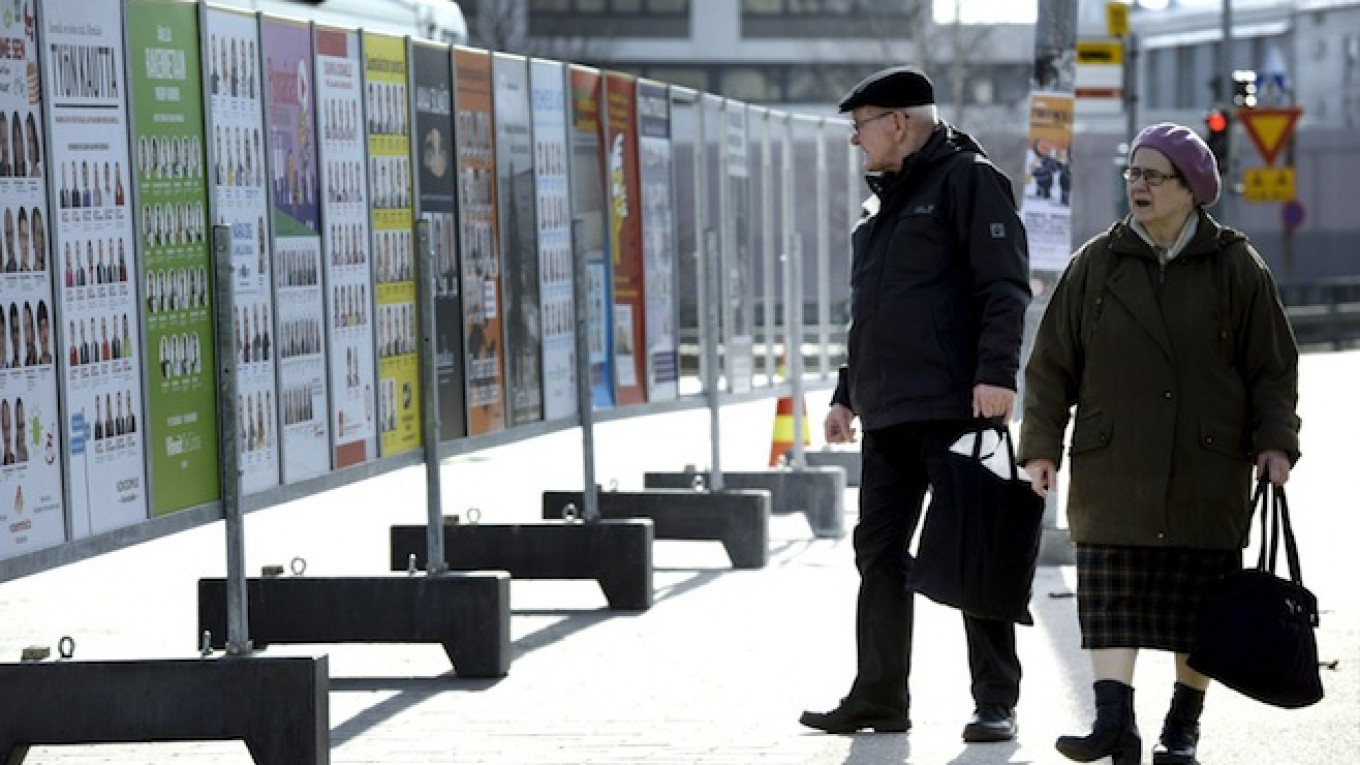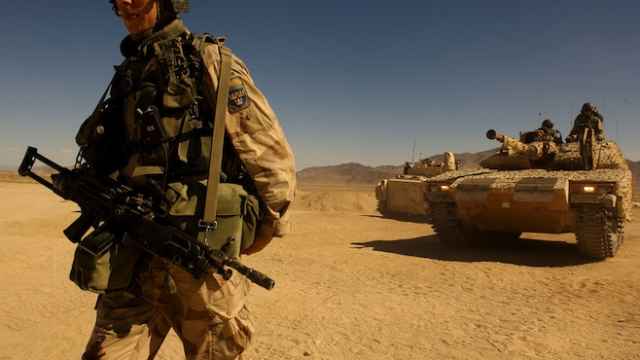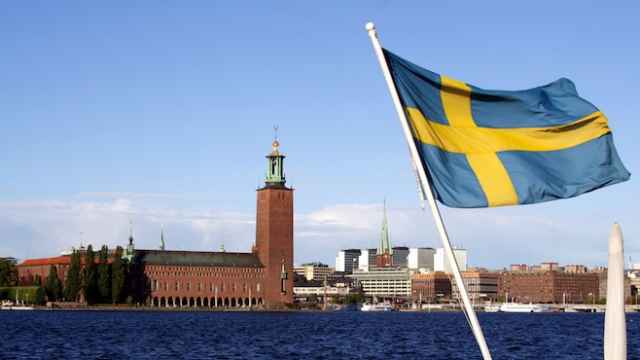HELSINKI — From closer NATO ties to rumors of Kremlin-backed land deals on its border, Finland's diplomatic balancing act with Russia has come under the spotlight before Sunday's parliamentary election as politicians debate how far to challenge the Kremlin.
The vote sees centrist opposition front-runner Juha Sipila, who favors military non-alignment along with two other major parties, battling center-right incumbent Prime Minister Alexander Stubb, who advocates joining NATO.
The debate was mirrored regionally after an unprecedented hawkish joint statement last week by Nordic countries — Sweden, Norway, Finland, Denmark and Iceland — that directly cited the Russian "challenge" as grounds to increase defense cooperation.
For the Nordics it reflected a year of Russian air force sorties, spy accusations and military border exercises. Moscow retorted immediately, saying moves by Finland and Sweden toward closer ties with NATO were of "special concern."
"It's unheard of to explicitly link Nordic defense cooperation to the Russian threat," said Anna Wieslander, deputy director of the Swedish Institute of International Affairs. "It clearly says 'us against Russia.'"
That would be a sea change for Finland, which shares an 833-mile (1,340-kilometer) border with Russia, with which it fought two bitter wars between 1939 and 1944, losing substantial territory.
The resulting "Finlandization" became a Cold War byword for self-imposed neutrality and a willingness to accommodate Soviet interests driven by fear of its neighbor.
Helsinki has moved closer to the West since it joined the European Union in 1995 and the euro zone in 1999, but — like Sweden — it is still not in NATO. With about 8 percent of its exports dependent on Russian trade, Helsinki also tries to toe a pragmatic line with its former ruler.
That status quo has become strained with Russian air sorties and naval activity in the Baltic Sea, as well as by the economic impact of sanctions, stirring debate about how far Finland should follow the Western response to Russia's role in destabilizing Ukraine.
Polls show a majority of Finns are against joining NATO, but those numbers may be thinning — roughly a quarter of Finland's 5.5 million people agree with Stubb's pro-NATO posture. More Swedes are also coming round to joining the alliance.
Any hint of Sweden and Finland joining NATO rankles Russia — so much so that Prime Minister Dmitry Medvedev said in 2013 their entry into the alliance would force Moscow to "respond."
"Finland has moved on — mostly — from the political generation in whom the instinct not to offend Russia was so deeply ingrained that this was automatic," Keir Giles, a Russia expert at the Chatham House think tank, said in an e-mail. "But the legacy lives on in some areas."
"What has polarized the debate right now is a new willingness to call a spade a spade at an official level."
Finland was cautious about sanctions on Moscow over Ukraine and many politicians turned against Stubb's government over the common defense statement.
"Creating an image that Nordic cooperation … is based on the Russian threat cannot be justified," center-right President Sauli Niinisto said.
Sweden is also wondering whether to seek shelter in the U.S.-led alliance, abandoning two centuries of formal neutrality.
Russian warplanes made headlines in 2013 after staging a mock bombing run on Sweden. Reports of a submarine spotted off Stockholm led to its biggest mobilization since the Cold War.
Sweden and Finland are already moving closer to NATO. They cooperate with three Nordic states in NATO — Denmark, Norway and Iceland — and participated with the alliance in Afghanistan.
Last month, Russia's defense minister threatened to target Danish warships with nuclear weapons if Copenhagen joined NATO's missile defense system.
A rise in Finnish support for NATO feeds into a history of suspicion. Russian rule ended in 1917 and thousands of Finns died fighting the Soviets during World War II. Men spend up to a year in compulsory conscription.
Underscoring suspicions, Defense Minister Carl Haglund has expressed concerns about reports of Russian investments in Finnish land near military sites.
Yet diplomatic preoccupations are lost on many Finns who depend on links to Russia.
Russian tourists used to flock to the border town of Lappeenranta to take snow rides on reindeer or buy anything from clothes to groceries.
"This ruble crisis really hit this town from out of the blue. Many shops have been closed," said Sari Mustapaa, the manager of Galleria shopping mall.
Hit by a weaker ruble, the number of Russian visitors in Finland fell 13 percent to 4.5 million last year. Exports to Russia, its third-biggest export market, dropped 14 percent.
"Some old-fashioned Russophobia still remains around here. But this crisis has taught us how important Russian tourism and trade is in Finland," Mustapaa said.
A Message from The Moscow Times:
Dear readers,
We are facing unprecedented challenges. Russia's Prosecutor General's Office has designated The Moscow Times as an "undesirable" organization, criminalizing our work and putting our staff at risk of prosecution. This follows our earlier unjust labeling as a "foreign agent."
These actions are direct attempts to silence independent journalism in Russia. The authorities claim our work "discredits the decisions of the Russian leadership." We see things differently: we strive to provide accurate, unbiased reporting on Russia.
We, the journalists of The Moscow Times, refuse to be silenced. But to continue our work, we need your help.
Your support, no matter how small, makes a world of difference. If you can, please support us monthly starting from just $2. It's quick to set up, and every contribution makes a significant impact.
By supporting The Moscow Times, you're defending open, independent journalism in the face of repression. Thank you for standing with us.
Remind me later.






